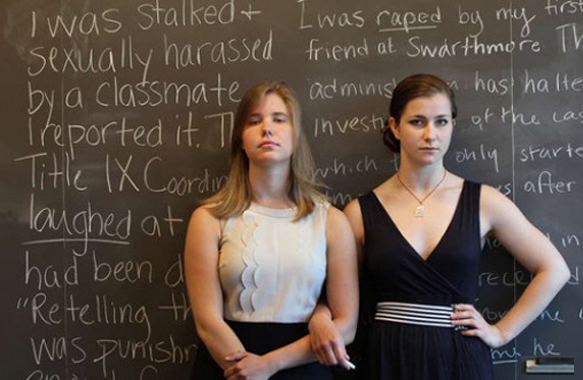Hope Brinn and Mia Ferguson stand in front of a blackboard where they have written their complaints about sexual assaults at Swarthmore College (Credit: Michael Bryant/Philadelphia Inquirer)
Years ago, while I do not recall how or why it happened I enrolled in classes. The intent was to be trained as a Sexual Assault Counselor – If only I knew. The instruction was comprehensive. The program intensive. The physical pain, the emotional stresses, the law, self-defenses, for months we were led through the “drill.” Survivors shared their stories, as did lawyers. Counselors, doctors and nurses too chimed in. We traveled to the hospital. We spoke with staff. Examination rooms and equipment, the ways in which samples were collected, and the clothing – each was a lesson lived. And perhaps that is the best education, one that evokes reflection. What I learned is that too much persists. We botch. We blame. We never think to file a claim.
Indeed, I wonder, had I not participated in the program would I have ever known what I do today. As I sat in those classes, I saw what passes; my life flashed before me. Representatives from the District Attorney’s Office perhaps said it all. They taught us that at least in our county at the time, ignoring a person is considered a greater crime than physical abuse.
So today, with the all attention on campus rape, I ask, who are the criminals? What do we do to protect them – the colleges who ignore the crime? And what becomes of our children?
Yes, there are laws and possibly escape clauses. Let us consider Title IX was designed to look after our young, even when they are away at college. It was passed in 1972. The legislation requires gender equity for boys and girls in every educational program that receives federal funding. However, commonly we associate the law with athletics. What we have ignored is the law pertains to “Learning Environment and Sexual Harassment
Colleges Warned They Will Lose Federal Funding For Botching Campus Rape Cases
HANOVER, N.H. — Catharine Lhamon, Assistant Secretary for Civil Rights at the U.S. Department of Education, told a group of college administrators Monday that she would have no reservations about pulling a university’s funding if it showed a pattern of mishandling cases of sexual violence on campus.
Lhamon was speaking at a summit on sexual assault hosted at Dartmouth College, one of the 67 colleges and universities currently under investigation by Lhamon’s agency over concerns that they did not properly handle sexual violence cases. Colleges are required under the gender equity law Title IX to address sexual assault and harassment on campus. The ultimate punishment for a school violating Title IX is a complete loss of federal funding. No disciplinary procedure has ever gone that far, but Lhamon emphasized that the option is always on the table.
“Do not think it’s an empty threat,” Lhamon said Monday. “It’s one I’ve made four times in the 10 months I’ve been in office. So it’s one that’s very much in use.”
Lhamon’s remarks drew some applause.
The Office of Civil Rights’ lack of punitive abilities has caused activists and lawmakers to question whether the investigation process is really all that effective. Critics argue that it’s not realistic to expect the department to cut off all federal funding to a school, including student loans and Pell grants.
Lawmakers are considering adding more ways for the OCR to penalize a school for violating Title IX.
“It’d always be nice to have more tools. There’s always more we can use,” Lhamon said during the panel Monday. “Where I sit today, I think we have a set of very, very effective tools we can use.”
Lhamon said the criticism of the OCR’s effectiveness investigating colleges was due to a “lack of understanding” about the tools available to the office for sanctioning institutions.
“That is our fault that we haven’t always been transparent,” she said.
To address transparency issues, Lhamon said the Education Department will need to post online more of the resolution agreements it reaches with the schools it investigates. Lhamon said it’s been “useful” for the agency to post a list of universities under Title IX investigation relating to sexual assault.
Lhamon added that she was hopeful there could be a bulk-up of staff at the OCR to enforce Title IX, something that Sen. Claire McCaskill (D-Mo.) has indicated she wants to push for.
The assistant secretary also acknowledged recent criticism that the Education Department has been placing unreasonable expectations on schools to address campus rape.
“I resist pretty hard [the idea] that schools don’t have a role in this. They absolutely do,” Lhamon said during the panel. “This is fundamental to the educational mission … The reality that sexual assault is a crime does not take away from the ways it creates a hostile environment for students that are subject to it.”
“Our disciplinary and grievance procedures were designed to provide appropriate resolution of institutional standards for student conduct, especially with respect to academic matters,” Molly Corbett Broad, head of college lobbying group the American Council on Education, wrote to the Senate’s education committee last month. “They were never meant for misdemeanors, let alone felonies.”
Broad noted in her letter, dated June 25, that the Education Department has continued to provide schools with guidelines on how to address issues that law enforcement often fails to deal with.
At one point during Monday’s panel, the moderator asked what the federal government is doing to get more local district attorneys to prosecute campus rape cases, a question that drew a huge round of applause from the audience.
Anurima Bhargava, chief of the Educational Opportunities Section of the Civil Rights Division at the U.S. Department of Justice, pointed to a recent multi-pronged investigation of the University of Montana, undertaken by school authorities and police and prosecutors from Missoula, Montana, as one example of successful collaboration between a school and local law enforcement. Bhargava said the DOJ would be releasing guidance on how campuses can work with local law enforcement and prosecutors in the coming months.
When asked if Title IX should be expanded to cover student groups like Greek houses, Bhargava said that in fact “it does cover organizations on campus,” whether it be a chess club, a fraternity or a sports team.
Lhamon and Bhargava were generally reserved in their praise for colleges, declining to name a school that’s doing exceptionally well. They did applaud schools that proactively implement campus climate surveys to see how students feel about sexual assault at their college, though they did not cite specific examples.












Leave A Comment